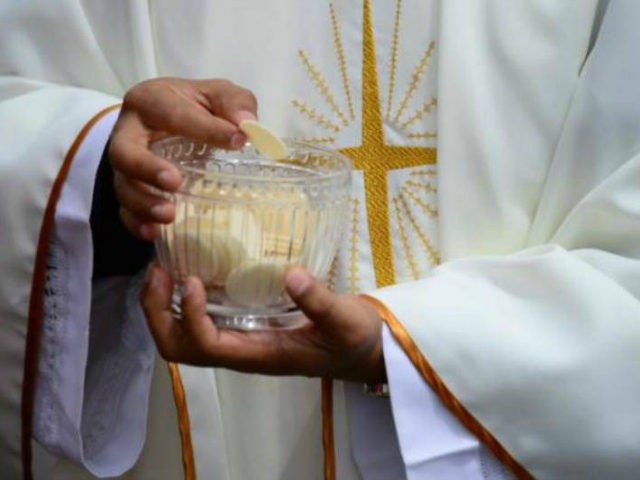The U.S. bishops voted overwhelmingly Friday to approve drafting a document on the reception of Holy Communion, a topic with clear repercussions for President Joe Biden, a professed Catholic who supports the expansion of abortion rights.
Approximately three-quarters of the bishops (168) voted in favor of drafting the text, while only 55 voted against, with 6 abstentions.
In past months, numerous bishops have weighed in on the topic of denying Holy Communion to public figures such as Joe Biden, Catholics who flout Catholic teaching and actively promote injustices the Church considers gravely evil.
On May 1, the archbishop of San Francisco, Salvatore Cordileone, published a pastoral letter examining “the evil of abortion” and “the meaning of receiving Holy Communion.”
In that letter, Archbishop Cordileone wrote that Catholic politicians who advance pro-abortion legislation cooperate in the “grave moral evil” of killing an unborn child and should not receive Holy Communion.
“In the case of public figures who profess to be Catholic and promote abortion, we are not dealing with a sin committed in human weakness or a moral lapse: this is a matter of persistent, obdurate, and public rejection of Catholic teaching,” he wrote.
Last December, Archbishop Charles Chaput warned of confusion among the faithful if bishops indicate their willingness to give Holy Communion to Biden despite his overt support for abortion.
“Public figures who identify as ‘Catholic’ give scandal to the faithful when receiving Communion by creating the impression that the moral laws of the Church are optional,” Chaput wrote. “And bishops give similar scandal by not speaking up publicly about the issue and danger of sacrilege.”
In one of his first acts as pope, Francis wrote to the Bishops of Argentina instructing them to govern the Church there following the Aparecida document, a 2007 text from the Latin American bishops urging “Eucharistic coherence.”
“We should hold ourselves to ‘eucharistic coherence,’ that is, we should be conscious that people cannot receive holy communion and at the same time act or speak against the commandments,” the text declared, “in particular when abortion, euthanasia, and other serious crimes against life and family are facilitated.”
“This responsibility applies particularly to legislators, governors, and health professionals,” the document clarified.
“We hope that legislators, leaders and health professionals, aware of the dignity of human life and the roots of the family in our peoples, will defend and protect it from the abominable crimes of abortion and euthanasia; this is their responsibility,” the document stated.
“Faithfulness to Jesus requires us to combat the evils that harm or destroy life, such as abortion, wars, kidnapping, armed violence, terrorism, sexual exploitation and drug trafficking,” the text noted.
According to the Catechism of the Catholic Church, “Anyone who is aware of having committed a mortal sin must not receive Holy Communion, even if he experiences deep contrition, without having first received sacramental absolution.”
“St. Paul urges us to examine our conscience: ‘Whoever, therefore, eats the bread or drinks the cup of the Lord in an unworthy manner will be guilty of profaning the body and blood of the Lord. Let a man examine himself, and so eat of the bread and drink of the cup,” the Catechism recalls.
In debating Eucharistic coherence, the Vatican has encouraged the U.S. bishops to find guidance in a 2004 letter from Cardinal Joseph Ratzinger — the future Pope Benedict XVI — written when a similar issue arose regarding Secretary of State John Kerry, who professed to be Catholic but publicly supported abortion rights.
When a Catholic politician’s formal cooperation in the grave sin of abortion or euthanasia becomes manifest, such as “his consistently campaigning and voting for permissive abortion and euthanasia laws,” his bishop should meet with him, Ratzinger wrote.
The bishop should instruct him about the Church’s teaching, “informing him that he is not to present himself for Holy Communion until he brings to an end the objective situation of sin, and warning him that he will otherwise be denied the Eucharist,” the cardinal stated.
“When these precautionary measures have not had their effect or in which they were not possible, and the person in question, with obstinate persistence, still presents himself to receive the Holy Eucharist, the minister of Holy Communion must refuse to distribute it,” Ratzinger wrote (emphasis added).
During Friday’s discussion, Archbishop Joseph Naumann of Kansas City, who heads up the bishops’ office for pro-life activities, noted that abortion is not the only concern regarding a Catholic’s fitness for Communion, but having a pro-abortion Catholic president has brought attention to the issue and forced the bishops’ hand.
“It’s not the bishops that have brought us to this point — it’s really, I think, some of our public officials,” Naumann said, noting that Biden talks about abortion as a right.
“This is a Catholic president that’s doing this, the most aggressive thing we’ve ever seen in terms of this attack on life — when it’s most innocent,” he said.

COMMENTS
Please let us know if you're having issues with commenting.